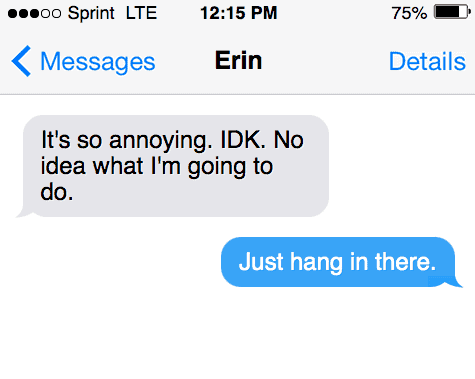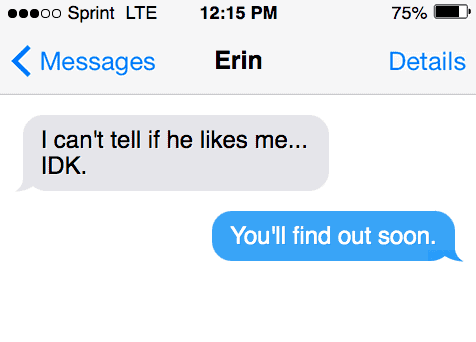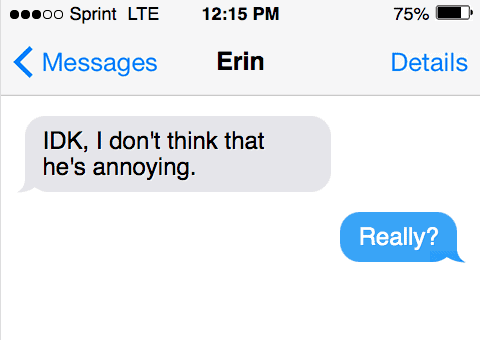What does “IDK” mean over text message? When someone says, “IDK,” are they trying to say I Disagree Kindly? What is the intention behind the acronym? The English language is changing dramatically thanks to the internet. It can be confusing to keep up with internet slang and the meanings behind each abbreviation.
Learn what “IDK” means in this short guide…
“IDK” definition and meaning
“IDK” stands for, “I don’t know.” It’s most commonly used in text messaging when a person is asked a question and the response to the question is simply, “I don’t know.”
The acronym “IDK” is a type of initialism often found on the internet and through text messaging.

Capitalization
Most commonly, the acronym is used in ALL CAPS. It is common in text speak to use ALL CAPS when trying to “shout” something at another person. Although, in this situation, it is not considered a loud shout in text messages.
Correct use: IDK
Correct use: idk
Incorrect use: iDK
Incorrect use: iDk
Intention (synonyms)
It is used in a sentence to display unknown information. Or to lack an answer.
- Not having an answer.
- Unknown.
- Confusion.
Usage
It is common for “IDK” to appear in informal communication between two friends. It is less common for the acronym to appear in formal business. This includes business letters and Microsoft Teams or Slack.
Here is where the “IDK” acronym is most commonly used:
Social media: Snapchat, TikTok, Instagram, and Snapchat.
Instant messages: Discord, IRC, and other online forums.
Text messages: Group and direct conversations with friends.

History and origin of “IDK”
Urban Dictionary dates “IDK” back to 2009. Making it a more recent acronym used by younger generations. It is one of the more popular online abbreviations to receive adoption.
Google Trends show the term has gained steadily in popularity since 2013.
Examples of “IDK” getting used in a conversation
Here are examples of where “IDK” is getting used in a text conversation.
Example one
Friend 1: “Do you know where we ended up last night? I lost my phone and can’t figure out where it is.”
Friend 2: “IDK, I don’t really remember anything, to be honest.”
In this example, the friend is starting the sentence with “IDK.” The “IDK” acronym is getting used to save keystrokes when saying the phrase, “I don’t know.” In the above example, the second friend is trying to express to the first friend that they don’t know the answer to their question.

Example two
Friend 1: “I feel like she might not like me that much, IDK. What do you think?”
Friend 2: “It’s possible. She seems great. Has she been texting you a lot?”
The second example shows the first friend using “IDK” as a way of showing confusion about a scenario. They are feeling like they don’t know whether a person likes them. The “IDK” acronym helps to describe the point of confusion about the situation.
Similar short forms and abbreviations
Here are similar acronyms that could get used in a conversation:
FYI: Or “For Your Information.” This expression is used to inform someone of a counter perspective than the one getting shared. Typically, this phrase gets used to inform a person of new information.
IMHO: Which stands for, “In My Honest Opinion.” One of the phrases that is typically used to share a point of view that differs from the one getting shared.
TBH: Standing for, “To Be Honest.” This is used when a friend wants to be honest with another friend. And uses “TBH” in order to soften the delivery of the potentially aggravating opinion or perspective.
Sources
- IDK – Wiktionary
- IDK – Simple English Wiktionary
- IDK | definition in the Cambridge English Dictionary
- Idk – Urban Dictionary
- IDK definition and meaning | Collins English Dictionary
Inside this article
Fact checked:
Content is rigorously reviewed by a team of qualified and experienced fact checkers. Fact checkers review articles for factual accuracy, relevance, and timeliness. Learn more.
Core lessons
Glossary
- Abstract Noun
- Accusative Case
- Anecdote
- Antonym
- Active Sentence
- Adverb
- Adjective
- Allegory
- Alliteration
- Adjective Clause
- Adjective Phrase
- Ampersand
- Anastrophe
- Adverbial Clause
- Appositive Phrase
- Clause
- Compound Adjective
- Complex Sentence
- Compound Words
- Compound Predicate
- Common Noun
- Comparative Adjective
- Comparative and Superlative
- Compound Noun
- Compound Subject
- Compound Sentence
- Copular Verb
- Collective Noun
- Colloquialism
- Conciseness
- Consonance
- Conditional
- Concrete Noun
- Conjunction
- Conjugation
- Conditional Sentence
- Comma Splice
- Correlative Conjunction
- Coordinating Conjunction
- Coordinate Adjective
- Cumulative Adjective
- Dative Case
- Determiner
- Declarative Sentence
- Declarative Statement
- Direct Object Pronoun
- Direct Object
- Diction
- Diphthong
- Dangling Modifier
- Demonstrative Pronoun
- Demonstrative Adjective
- Direct Characterization
- Definite Article
- Doublespeak
- False Dilemma Fallacy
- Future Perfect Progressive
- Future Simple
- Future Perfect Continuous
- Future Perfect
- First Conditional
- Irregular Adjective
- Irregular Verb
- Imperative Sentence
- Indefinite Article
- Intransitive Verb
- Introductory Phrase
- Indefinite Pronoun
- Indirect Characterization
- Interrogative Sentence
- Intensive Pronoun
- Inanimate Object
- Indefinite Tense
- Infinitive Phrase
- Interjection
- Intensifier
- Infinitive
- Indicative Mood
- Participle
- Parallelism
- Prepositional Phrase
- Past Simple Tense
- Past Continuous Tense
- Past Perfect Tense
- Past Progressive Tense
- Present Simple Tense
- Present Perfect Tense
- Personal Pronoun
- Personification
- Persuasive Writing
- Parallel Structure
- Phrasal Verb
- Predicate Adjective
- Predicate Nominative
- Phonetic Language
- Plural Noun
- Punctuation
- Punctuation Marks
- Preposition
- Preposition of Place
- Parts of Speech
- Possessive Adjective
- Possessive Determiner
- Possessive Case
- Possessive Noun
- Proper Adjective
- Proper Noun
- Present Participle
- Prefix
- Predicate



